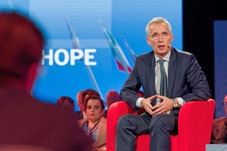
Jens Stoltenberg Emphasizes NATO's Expectation for Georgia to Adhere to Sanctions and Prevent Russian Support for Aggression in Ukraine
By Liza Mchedlidze
Friday, May 26, 2023
During the The Road to Vilnius discussion hosted by the German Marshall Fund in Brussels, NATO Secretary General Jens Stoltenberg addressed the issue of Georgia's role in the pattern of Russian aggression. He emphasized that Georgia's involvement in this pattern did not commence in 2014 alongside the war in Ukraine, but rather in 2008 when Russia invaded Georgia.
The question posed to Jens Stoltenberg was about how NATO could assist the Georgian people in avoiding potential Russian aggression, given the ongoing war in Ukraine and the overall Russian threat. The question also emphasized the importance of Georgia moving forward towards NATO membership.
Stoltenberg stated that the ongoing war in Ukraine serves as a vivid reminder of a broader pattern of Russian aggression. He emphasized that the failed attempts to build a better and friendlier relationship with Russia after the Cold War were primarily due to Russia's aggressive behavior. Stoltenberg highlighted Russia's objective of re-establishing spheres of influence to control neighboring countries, which contradicts the vision of a world where all nations can enjoy independence.
He strongly expressed NATO's belief in the importance of every country, including former Soviet republics and former members of the Warsaw Pact, having the right to maintain their independence.
Stoltenberg explained that NATO has been actively engaged with Georgia for many years, providing assistance in implementing reforms and fostering practical and political cooperation. He acknowledged that countries that are not NATO allies, but are caught in-between, face vulnerability and resistance against Russian coercion. In response to this, NATO made the decision to enhance support for these countries, including Georgia, at the Madrid Summit.
The NATO Secretary General emphasized the importance of Georgia upholding democratic values, as it is crucial for NATO's engagement. Additionally, he expressed the expectation that non-NATO allies should adhere to sanctions and avoid facilitating Russia's financing and organization of aggression against Ukraine.
"So it is this pattern, that is a stark reminder of that, this is not only about this war in Ukraine, it is about that the relationship we tried at the end of the Cold War to build with Russia, a better, friendlier relationship has failed because of Russia's aggressive behavior. They want to re-establish spheres of influence to control neighbors and of course, that's not the world we would like to live in because that means that a lot of neighbors, former Soviet republics and members of the Warsaw Pact, will not have the independence, we strongly believe that all countries should have.
Therefore, NATO has worked with Georgia for many, many years, we have helped to implement reforms, practical, political cooperation. And of course, after the war we have also seen that countries which are neither, which I would call them sometimes "in between", which is I think not the best phrase but which are not NATO Allies, but then try to also resist coercion from Russia. They are vulnerable. So we are, we decided at the Madrid Summit to step up what we do for these countries on the verge, Georgia is one of the strongest examples. Having said that, I think also we have to understand that it is important Georgia lives up to the democratic values we all believe in. And of course, we also expect non-NATO Allies to adhere to the sanctions and to not make it easier for Russia to finance and to organise the war of aggression against Ukraine," Stoltenberg stated.

